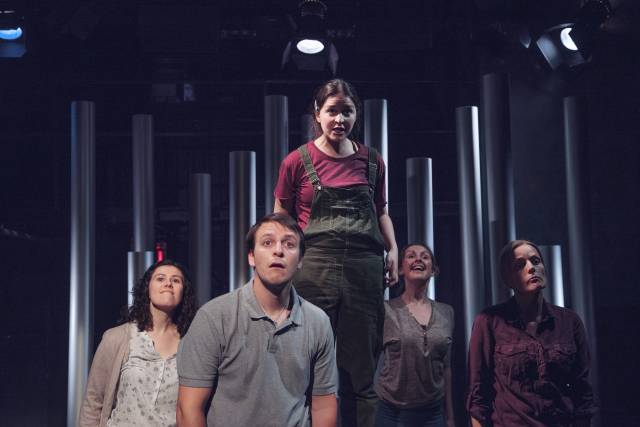

The Welsh town where The Good Earth takes place, seems to be the romantic kind we’ve seen in countless movies, plays and TV shows, where everyone knows each other, and people go see their pastor for medical, legal and spiritual advice. But as an enraged James (Michael Humphreys) points out, “the authorities and these people from up England think we’re simple people with simple lives”, when in fact there is so much more than meets the eye. The authorities have announced that due to the impending collapse of a nearby mountain, everyone needs to leave town and relocate to a government approved location, which might provide them safety from the elements but will undoubtedly mean that they will lose their identity. What follows is a thought-provoking, gripping play about physical vs. spiritual survival.
Conceived by Welsh theatre company Motherlode, the show smartly uses traditional songs to highlight the town’s rich legacy, but also to show the music’s fugacity, these songs might be lost forever if there is no one who remembers them. This sense of duality pervades through all of The Good Earth, there are moments in which characters mix up words (bondage and bonding, compote and compost) which makes for funny moments, but also shows the ease with which beauty can turn hideous, another example of this duality comes from the design by Buddug James Jones who uses tables for their traditional purpose, but also to represent mountains and caves. Similarly there are several pipes of different heights towards the back of the stage that perfectly can look as factory chimneys, rooftops and organ pipes.
Directed with style by Rachael Boulton (who also stars in the show as a widowed woman trying to raise her children), the show makes for a compelling experience as America enters one of its most controversial presidential elections. Throughout the show, the characters address invisible councilmen, whose responses we can’t hear, but whose effect has devastating consequences on the lives of these people. The show presents us with endless opportunities for empathy, both in the intimate scale (there are tender stories about family that wouldn’t seem out of place in John Ford films), but also on a collective one, as we become invested in the plights of the entire town. We can’t help but feel a moral obligation to leave the theater and demand that governmental institutions help fulfill our needs, which makes The Good Earth, rousing political theatre of the best kind.